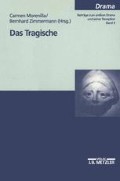Abstract
Tragedy holds a unique place in the history of Western literature. Not only has it proved the most long-lasting of major genres, powerfully rediscovered or reinvented as a series of individually vital forms in (most notably) Imperial Rome, Renaissance Italy, Elizabethan England, seventeenth-century France, eighteenth-century Germany, and beyond. It has also become the object of theoretical debates whose intense and frequently metaphysical aspirations have a more philosophical scope than is to be found in the criticism of any other genre. These two factors are acknowledged, in the reverse order to mine, in the subtitle of this new collection: tragedy as an ‘idea’ (or, more appropriately, a complex nexus of ideas), and, on the other hand, as the stuff of a protean history of theatrical and literary-dramatic ‘transformations’. But it is an immediate reservation about this new collection that despite, or even because of, the range of interesting ways in which it explores different manifestations of tragedy it shows an inadequate awareness of the tension between the idea and the transformations of tragedy.
Preview
Unable to display preview. Download preview PDF.
Notes
Schwinge’s epilogue, which makes the shrewd suggestion that the history of tragedy could be illumnated by a study of anti-tragic mentalities, is far too brief to make clear just what the concept of ‘die Tragik’ encompasses: even in invoking Aristotle as the supposed fountainhead of this approach to tragedy, Schwinge makes a debatable claim; cf. my ‘Plato and the Repudiation of Tragedy’, in Michael Silk (ed.) Tragedy and the Tragic (Oxford, 1996) 332–49, at 333–5.
For the kind of editorial shaping that is possible for such a collection, but conspicuously absent here, see the volume cited in my previous note, whose sectional introductions (by Michael Silk) do much to bring out the interplay of themes and issues across the book as a whole.
A. brief account of the combination of this opaqueness with a recognition (not altogether unlike Schmitt’s) of the scope of human agency in tragedy is the main point of my own article, ‘Human Limits and the Religion of Greek Tragedy’, in Literature & Theology (1990) 169–80.
Zeller overlooks a monograph on the Merope story: M. Petrovska, Merope: the Dramatic Impact of a Myth (New York, 1984)
It is striking that Broich and Vogel (both non-classicists) are the only contributors to the volume to give any weight to the place of ritual in tragedy, though neither is much concerned with recent work by classicists on this aspect of Greek tragedy. Flashar’s introduction apparently endorses Aristotle’s neglect of tragedy’s cultic-ritual context, and Schwinge’s epilogue suggests that the concept of ritual has been a distorting preoccupation in much modern work on the genre. But for a volume which purports to take a large perspective on the history of tragedy, these are unsatisfactorily marginalising references to ritual: whatever view one may take of various ‘ritualist’ schools of criticism of Greek tragedy, this is one of many issues which cry out for treatment within a fuller statement of the collection’s position on the spectrum of modern approaches to the subject. This underlines my earlier complaint about the volume’s lack of a proper editorial synthesis of its contents and significance.
Author information
Authors and Affiliations
Editor information
Copyright information
© 2000 Springer-Verlag GmbH Deutschland
About this chapter
Cite this chapter
Halliwell, S. (2000). Tragödie: Idee und Transformation. In: Morenilla, C., Zimmermann, B. (eds) Das Tragische. J.B. Metzler, Stuttgart. https://doi.org/10.1007/978-3-476-02694-1_14
Download citation
DOI: https://doi.org/10.1007/978-3-476-02694-1_14
Publisher Name: J.B. Metzler, Stuttgart
Print ISBN: 978-3-476-45242-9
Online ISBN: 978-3-476-02694-1
eBook Packages: J.B. Metzler Humanities (German Language)

